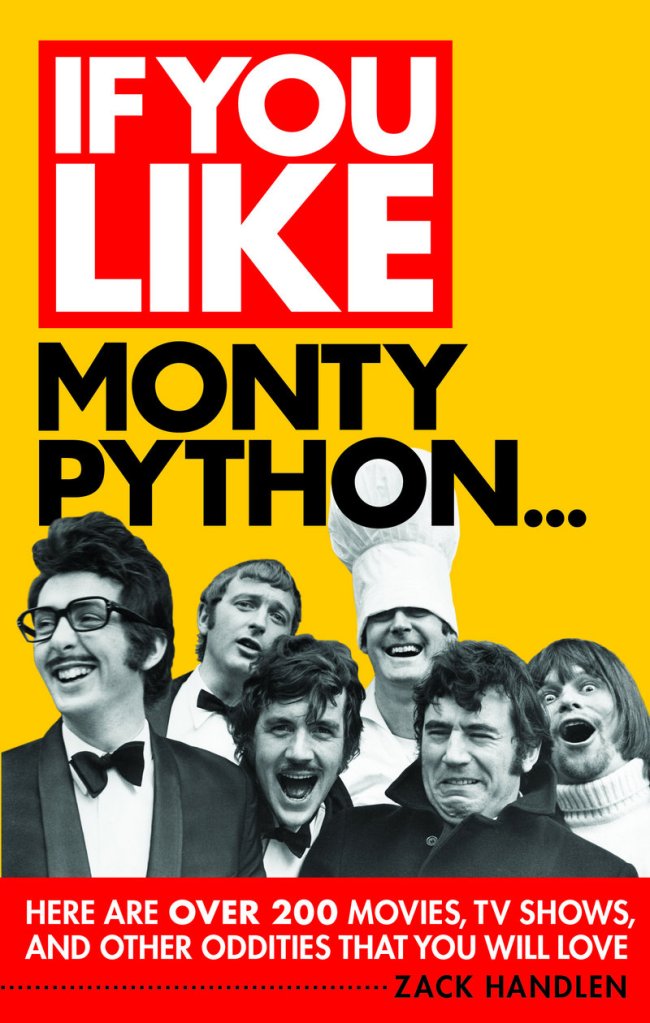Zack Handlen works in a library, so he knows a little bit about research.
That may be why his new book, “If You Like Monty Python” (Hal Leonard, $14.99), is constructed sort of like a well-thought-out term paper.
Handlen begins with the thesis that if you are a fan of the wacky British comedy troupe Monty Python, your funny bone will also by tickled by the stuff the Python guys found funny growing up.
And he further connects the dots between Python and later comics and comedies that were influenced by Python or share some characteristics – sometimes subtle ones – with the Brit comedy legends. The TV series “Monty Python’s Flying Circus” began airing more than 40 years ago, so the troupe’s influence is pretty spread out by now.
The book is part comedy history and part comedy analysis. It helps Python fans identify things to watch that they might have otherwise missed.
Handlen, 32, lives in Portland, writes for the online publication The Onion A.V. Club, and works at the Bates College library in Lewiston. This is his first book.
Q: Where did you get the idea to write this book?
A: The editors at Hal Leonard were putting together this “If You Like” series, and they contacted my boss (at The Onion A.V. Club) asking if he knew someone who’d be interested. I also write a lot of TV reviews, so I decided to pitch a Monty Python book. It’s something I’m pretty familiar with, and I figured there would be a lot of room to write about lots of kinds of comedy.
Q: Were you already a Python scholar when you began?
A: I own the entire TV series, and I’ve seen all the movies. I began researching the history, reading about the members and how they got together. And then I rewatched the shows and listened to audio albums, and tried to put together things they said about what their influences were. I spent a few months (while working his regular job) on the research, but it was very pleasurable work.
Q: Where does Monty Python’s humor come from? What were some of their influences?
A: They’ve talked a lot about “The Goon Show,” which was a British radio show with Spike Milligan and Peter Sellers and others. It’s available on iTunes. It’s terrific. Each episode does a long-form sketch, with self-referential humor and word play. They also talk a lot about “Beyond the Fringe,” a theater revue that Dudley Moore and Peter Cook and others did. It was very much like prep school humor, intellectual.
Q: From what you learned watching and reading about Monty Python, how did you then reason out what kind of comedy Python fans would also like?
A: Well, I started with other things that I like and looked at similar comedy sketch shows. “Saturday Night Live” obviously had that same free-wheeling feeling. Then there’s the TV show “The Kids in the Hall,” which was probably one of the most consistently funny sketch shows ever. And “Second City Television,” which had John Candy (and Portland native Andrea Martin). From there, I went to other TV shows with a similar sense of humor, British shows like “The IT Crowd” and “Black Books.” Here, there are sitcoms like “Community” (on NBC) which has a very Python vibe, very aware of itself and constantly one-upping itself in terms of what the expectations for the joke are. Then of course there’s the “Airplane” and “Naked Gun” movies.
Q: Are most of the things you recommend to Python fans, as far as similar comedy, readily available?
A: One of the rules I had was I would only recommend things that people could get in the states, or through Netflix or something like that. I didn’t want to mention things people couldn’t see for themselves.
Q: Do you have a favorite Monty Python sketch or film scene?
A: It’s hard to say. My favorite film is “Life of Brian.” I think it’s the best “movie” movie they made. But I love “Monty Python and the Holy Grail” too.
For sketches, there’s this very early sketch, I think it’s in the first or second episode (of the TV show), about the world’s funniest joke. If you hear it, you die laughing. So people keep dying and the government gets a hold of it, during World War II, and starts using it for military applications.
Staff Writer Ray Routhier can be contacted at 791-6454 or at:
rrouthier@pressherald.com
Twitter: @RayRouthier
Send questions/comments to the editors.





Success. Please wait for the page to reload. If the page does not reload within 5 seconds, please refresh the page.
Enter your email and password to access comments.
Hi, to comment on stories you must . This profile is in addition to your subscription and website login.
Already have a commenting profile? .
Invalid username/password.
Please check your email to confirm and complete your registration.
Only subscribers are eligible to post comments. Please subscribe or login first for digital access. Here’s why.
Use the form below to reset your password. When you've submitted your account email, we will send an email with a reset code.